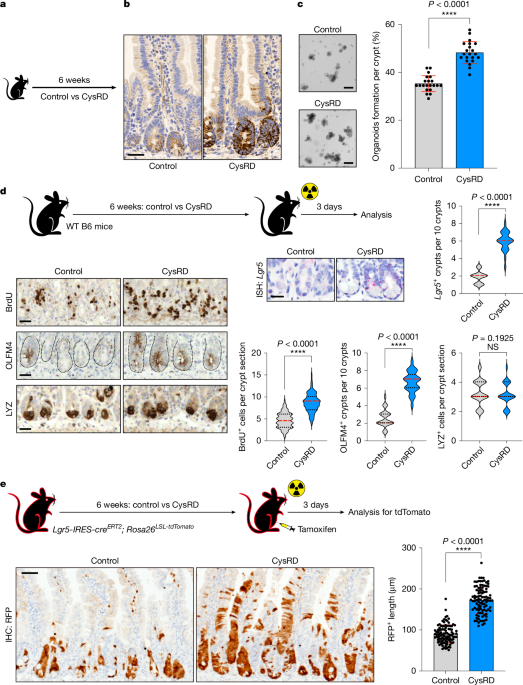
"A fundamental question in physiology is understanding how tissues adapt and alter their cellular composition in response to dietary cues1,2,3,4,5,6,7,8. The mammalian small intestine is maintained by rapidly renewing LGR5+ intestinal stem cells (ISCs) that respond to macronutrient changes such as fasting regimens and obesogenic diets, yet how specific amino acids control ISC function during homeostasis and injury remains unclear."
"Here we demonstrate that dietary cysteine, a semi-essential amino acid, enhances ISC-mediated intestinal regeneration following injury. Cysteine contributes to coenzyme A (CoA) biosynthesis in intestinal epithelial cells, which promotes expansion of intraepithelial CD8αβ+ T cells and their production of interleukin-22 (IL-22). This enhanced IL-22 signalling directly augments ISC reparative capacity after injury. The mechanistic involvement of the pathway in driving the effects of cysteine is demonstrated by several findings: CoA supplementation recapitulates cysteine effects,"
Dietary cysteine enhances intestinal stem cell–mediated regeneration following injury by fueling epithelial coenzyme A (CoA) biosynthesis. Elevated epithelial CoA drives expansion of intraepithelial CD8αβ+ T cells and increases their interleukin-22 (IL-22) production, which directly augments ISC reparative capacity. CoA supplementation reproduces cysteine effects, while epithelial loss of the cystine transporter SLC7A11 abolishes the response. Mice lacking IL-22 in CD8αβ+ T cells or depleted of these cells fail to show enhanced regeneration despite cysteine. Coupled cysteine metabolism between ISCs and CD8+ T cells augments intestinal stemness and mitigates intestinal damage.
Read at Nature
Unable to calculate read time
Collection
[
|
...
]